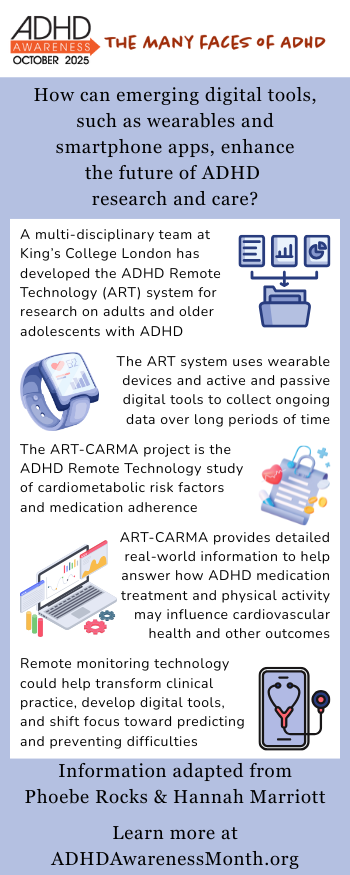RMT (Remote Monitoring Technology) offers continuous real-world ADHD data, aiding research on symptoms and health challenges. It also enables personalized care, empowering ADHD patients and shifting focus to prediction and prevention.

This month will see in the 21st celebration of ADHD Awareness Month; it is exciting to reflect on how far we’ve come in understanding ADHD both in children and adults. Looking ahead, how can new technology, specifically digital tools such as wearables and smartphone apps, help improve research, clinical care and self-management of ADHD in the future?
The multi-disciplinary team at King’s College London in the UK, led by Professors Jonna Kuntsi and Richard Dobson, has developed the ‘ADHD Remote Technology’ (ART) system for research on adults and older adolescents with ADHD. This system uses wearable devices and smartphone Active and Passive apps to collect real-world, ongoing data for long periods of time.
One of our team’s ongoing projects is the ADHD Remote Technology study of cardiometabolic risk factors and medication adherence (ART-CARMA). Together with our second data collection site in Spain – led by Professor Toni Ramos – we recruited 305 adults from adult ADHD clinic waiting lists into the study.
So, what does ART-CARMA involve?
Each adult with ADHD is monitored remotely over a 12-month period, using our ART system. This means that we gather data from participants using both active and passive digital tools, without interrupting their daily life or activities. Active features include a smartphone app where participants can engage with study questionnaires, whereas passive features include a smartphone Passive App which collects data in the background. ART-CARMA participants also use a wearable device called the EmbracePlus (www.empatica.com/embraceplus), which tracks physical activity, sleep and changes in physiological measures such as heart rate.
The advantage of this approach is that it provides a continuous, real-world picture of living with ADHD, compared to relying solely on infrequent clinical visits. By gathering data directly from participants’ daily lives, ART-CARMA helps researchers better understand ADHD symptoms and associated health challenges, such as those relating to cardiovascular health, that are common in adults with a diagnosis.
While data collection for ART-CARMA is ongoing, we hope the study will contribute more detailed real-world information to help answer important questions, such as how ADHD medication treatment and physical activity may influence cardiovascular health and other outcomes in adults with ADHD. As previous research has shown that people with ADHD who have been prescribed medication, do not always take their medication consistently or may discontinue altogether, we want to learn more about the reasons for such choices.
Longer term, the potential is even more exciting: remote monitoring technology could help transform clinical practice, by offering clinicians and patients easy, timesaving access to personalised health-related information and advice. Digital tools could be developed that would empower people with ADHD to better understand and manage their symptoms. Thanks to these emerging technologies, the focus can shift toward predicting and preventing difficulties before they arise.
As ADHD Awareness Month continues, we are excited about how studies like ART-CARMA can contribute to the future of improved ADHD research and care, increasing effectiveness and tailoring treatment plans to the needs of individuals with ADHD.
Stay tuned and visit KCL’s ADHD Remote Technology (ART) LinkedIn for exciting updates!
About the Authors

Phoebe Rocks, Research Assistant at the Social, Genetic and Developmental Psychiatry Centre within the Institute of Psychiatry, Psychology and Neuroscience at King’s College London. Prior to joining the SGDP, Phoebe completed her Bachelor of Science in Psychology at the University of Leeds. Phoebe has previously worked as a Research Assistant at the Wolfson Centre of Applied Health Research, participating in the ‘Born in Bradford’ projects.With varied experience in NHS roles, she has strong interests in the use of remote technology in mental health research.

Hannah Marriott, Research Assistant at the Social, Genetic and Developmental Psychiatry Centre within the Institute of Psychiatry, Psychology and Neuroscience at King’s College London. Prior to joining the team, Hannah completed a BSc in Psychology and a MSc in Applied Neuropsychology, both at the University of Bristol. Hannah has previously worked as an NHS Research Assistant and has a strong interest in mobile health and health technology innovation.
Acknowledgements
A huge thank you to our amazing study participants, research teams at KCL and VHIR, Empatica, ADDISS and TIMESPAN for supporting this research. We also thank our collaborating NHS clinics, for their support in the recruitment of participants into the ART-CARMA study. This project has received funding from the European Union’s Horizon 2020 research and innovation programme under grant agreement No 965381.
